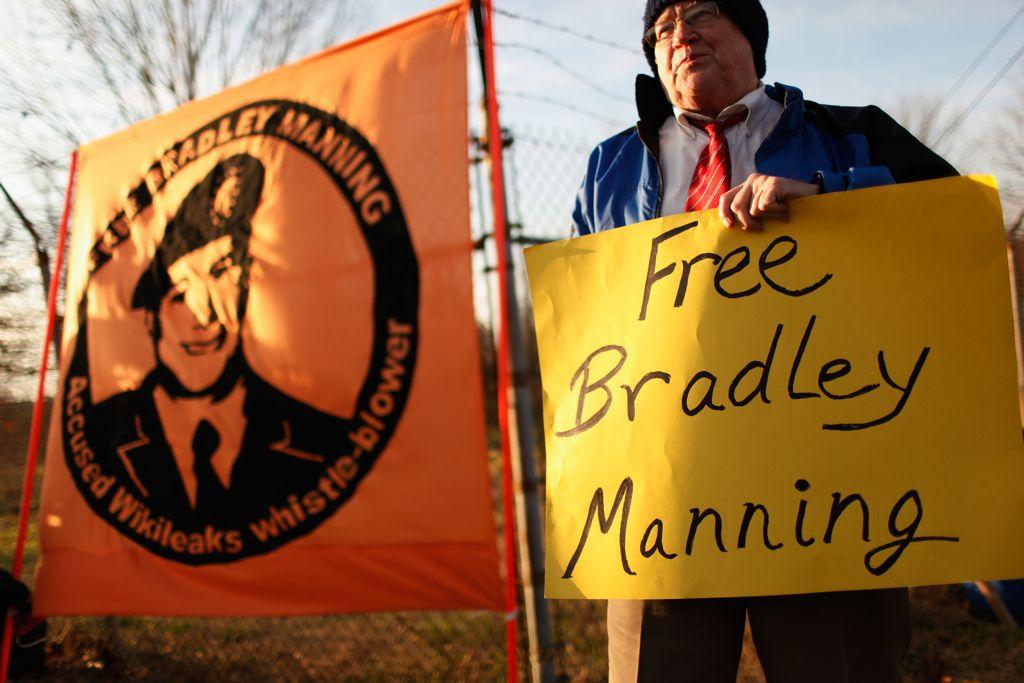Bradley Manning appears in military court, lawyer accuses judge of bias
Supporters of US Army Private Bradley Manning, hold vigil outside the gates of Fort George G. Meade, Maryland, where Manning’s Article 32 preliminary hearing began on December 18, 2011.
Private Bradley Manning was in court in Maryland for a pre-trial hearing Friday, the first time he has appeared in public since his arrest in 2010.
The US Army analyst, 23, is accused of leaking hundreds of thousands of confidential US documents to WikiLeaks whistleblowers.
He appeared in the courtroom at the Fort Meade Army base dressed in military khaki and wearing black-rimmed glasses, according to the Guardian's correspondent Ed Pilkington. Manning took notes and replied "Yes, sir," when asked if he understood the charges and had satisfactory legal counsel.
Early into the hearing, his lawyer David E. Coombs accused the investigating officer acting as judge of "being a defence department stooge," Pilkington reported.
More from GlobalPost: WikiLeaks: limited damage
Strict media restrictions prevented journalists giving full details of the hearing as it happened. Updates were forbidden while the court was in session and the media center's internet connection switched off, according to Politico, which reported that the Pentagon Press Association had protested the exceptionally restrictive rules.
Meanwhile, the parts of the proceedings judged to be sensitive to national security will be carried out in private session with no members of the public present.
The high level of security at the hearing, as well as the fact that it was scheduled for a pre-Christmas weekend, has prompted Manning's supporters to accuse authorities of attempting to minimise media coverage and public protests, the Guardian said.
Protesters gathered outside Fort Meade Friday and another vigil is planned for Saturday, Manning's 24th birthday.
More from GlobalPost: One in four US hackers "an FBI informer," UK report says
The Article 32 hearing, the equivalent of a pre-trial hearing, is expected to last around five days, according to the BBC. Lawyers for the prosecution and the defense will present their initial arguments, after which recommendations will be made to a military general, who will then decide whether to proceed to a full trial.
Manning is not expected to give a statement, according to the Washington Post.
He faces 23 charges of obtaining and sharing government secrets, the most serious being that he violated the Espionage Act and aided the enemy. The latter potentially carries the death penalty, though the Army has said it will not seek it.
The charge will also be the most difficult to prove, military law expert Michael J. Navarre told the Post, since the records of Manning's online conversations about the leaks refer only to placing classified information in the public domain, not to giving it to America's enemies.
The defense will argue that the leaked documents did not do significant damage to national security, according to Coombs.
Hours before Manning's court appearance, WikiLeaks co-founder Julian Assange was granted the right to appeal against his ordered extradition to Sweden in the UK's highest court. Supreme Court judges will hear his case in February, the BBC reported.
The US has not yet decided whether or not to prosecute Assange for espionage.
More from GlobalPost: Imitators create new WikiLeaks sites
Every day, reporters and producers at The World are hard at work bringing you human-centered news from across the globe. But we can’t do it without you. We need your support to ensure we can continue this work for another year.
Make a gift today, and you’ll help us unlock a matching gift of $67,000!
